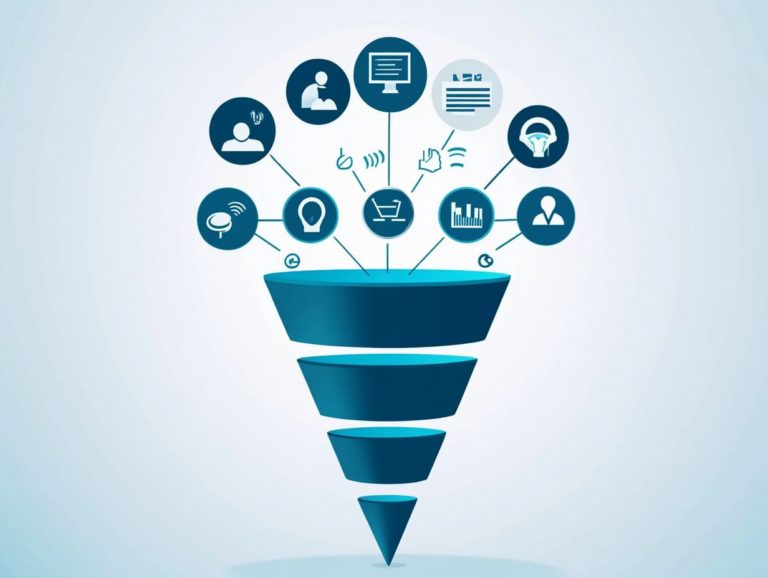Key Differences Between B2B and B2C Lead Generation
Let's Set Up Your Lead Generation Strategy
Fill out the form below, and our team will get in touch with you to create a tailored solution for your business.
Lead generation is an essential pillar of contemporary marketing, serving as the vital link between your business and potential customers.
Understanding lead generation is crucial. It s important to recognize the differences between B2B (Business-to-Business) and B2C (Business-to-Consumer) strategies.
Let s dive into the exciting world of lead generation! This exploration highlights the unique attributes of lead generation, shedding light on the contrasts in target audiences, marketing approaches, and sales processes.
It also uncovers the common threads that unite these two spheres, providing guidance to choose the most effective lead generation techniques tailored to your specific needs.
Contents [hide]
- Key Takeaways:
- What is Lead Generation and Why Does it Matter?
- Differences Between B2B and B2C Lead Generation
- Let's Set Up Your Lead Generation Strategy
- Common Ground in Lead Generation
- Let's Set Up Your Lead Generation Strategy
- Choosing the Right Lead Generation Approach
- Frequently Asked Questions
- Let's Set Up Your Lead Generation Strategy
- What are the differences in lead nurturing strategies for B2B and B2C lead generation?
- Is there a difference in the types of content used for B2B and B2C lead generation?
- How do B2B and B2C lead generation differ in terms of lead qualification?
- Do B2B and B2C lead generation require different marketing strategies?
Key Takeaways:

- B2B targets businesses; B2C focuses on individual consumers.
- While both aim to generate leads, their strategies and sales processes differ significantly.
- Consider your target audience and marketing strategies when choosing a lead generation approach.
What is Lead Generation and Why Does it Matter?
Lead generation is an essential process in both B2B and B2C marketing. It serves as the vital first step in the sales cycle to draw in potential customers. This process involves recognizing and developing leads through various marketing strategies specifically designed to resonate with your target audience.
This understanding helps you craft a strong marketing plan that aligns seamlessly with your sales objectives while enhancing the overall customer experience.
Definition and Importance
Lead generation is the art of attracting and converting potential customers into sales-qualified leads. It plays a crucial role in your customer acquisition strategy.
This essential element of marketing serves as a cornerstone for those looking to forge meaningful connections with their target audiences. By leveraging various channels such as social media, email campaigns, and content marketing, you can effectively find and engage segments of potential clients who show genuine interest in what you have to offer.
Lead generation allows for deeper customer engagement by enabling personalized communication, nurturing trust, and guiding prospects through the buying process. This structured approach not only enhances your conversion rates but also cultivates long-term loyalty, ensuring you stay competitive in an ever-evolving marketplace.
Differences Between B2B and B2C Lead Generation
The differences between B2B and B2C lead generation strategies can be quite pronounced due to the unique target audiences and specific sales processes inherent to each model.
In B2B marketing, your focus is typically on cultivating long-term relationships and diving into the intricacies of buyer behavior. In contrast, B2C lead generation often leans toward tapping into emotional appeals and achieving swift conversions through compelling promotional offers.
Target Audience
Identifying your target audience is crucial for both B2B and B2C lead generation, as it directly influences your marketing strategies and shapes buyer behavior.
In the B2B landscape, you’re often dealing with decision-makers and influencers within organizations. This calls for a more formal approach that emphasizes relationship-building and trust.
On the flip side, B2C revolves around individual consumers whose preferences are frequently swayed by emotional triggers and brand loyalty. This fundamental distinction leads to different marketing approaches; for instance, B2B strategies may prioritize long-form content and in-depth case studies, while B2C efforts might focus on eye-catching ads and social media engagement.
Let's Set Up Your Lead Generation Strategy
Fill out the form below, and our team will get in touch with you to create a tailored solution for your business.
By grasping these nuances in customer preferences, you can streamline your marketing efforts and enhance the overall buyer journey, fostering stronger connections and ultimately driving conversion rates.
Key Differences in Marketing Strategies

B2B and B2C lead generation strategies differ significantly. They use distinct channels and content types for better effectiveness.
In B2B marketing, the emphasis is typically on building lasting relationships through personalized communication. Trust and industry expertise are prioritized. Your approach includes content marketing strategies like whitepapers, case studies, and webinars, tailored to informed decision-makers seeking in-depth information.
B2C strategies leverage emotional appeals to forge personal connections with consumers. Platforms like Instagram, Facebook, and TikTok are essential for B2C campaigns, providing dynamic environments for brands to engage audiences through visually captivating content and targeted advertisements.
Email marketing also differs; B2B emails focus on nurturing leads with informative newsletters, while B2C messages drive impulsive purchases with limited-time offers and eye-catching visuals.
Understanding the Sales Process
The sales process in B2B and B2C contexts presents distinct characteristics, reflecting the varied stages of the sales funnel and methods to nurture leads.
In B2B environments, the sales cycle often unfolds as a lengthy decision-making journey. Potential clients engage with multiple stakeholders before making a purchase, necessitating a strategic lead-nurturing approach. This includes personalized communication and tailored content that addresses specific pain points. For instance, a software company might offer white papers and demos to effectively educate and engage prospects.
B2C sales generally emphasize swift transactions and emotional connections. A savvy retailer leverages targeted promotions and social media interactions to quickly capture interest. Recognizing these distinctions is essential for effective customer engagement, ensuring you build and maintain relationships that drive conversions and foster long-term loyalty.
Common Ground in Lead Generation
Despite their differences, B2B and B2C lead generation reveal key similarities that highlight core principles of effective marketing and customer engagement. Both approaches aim to generate leads through targeted marketing strategies. Understanding customer preferences and engaging meaningfully is crucial for cultivating enduring relationships.
Goal of Generating Leads
Generating leads, whether in the B2B or B2C landscape, aims to guide potential customers seamlessly through the sales cycle while enhancing their engagement.
Both models emphasize nurturing leads with timely and relevant communication to build trust and foster meaningful relationships. In a B2B context, this may involve personalized email campaigns, webinars, and case studies to resonate with your audience. Meanwhile, B2C businesses harness the power of social media interactions and loyalty programs to create emotional connections.
Strategies like content marketing, consistent follow-ups, and targeted advertisements are vital for keeping leads warm. Utilizing Customer Relationship Management (CRM) systems can streamline lead management, ensuring no potential customer slips through the cracks.
Ultimately, both B2B and B2C approaches emphasize the significance of a well-structured nurturing process to effectively convert leads into loyal customers.
Want to skyrocket your business growth? Start by building meaningful relationships!
Building relationships is essential for both B2B and B2C lead generation. It directly influences customer loyalty and retention both crucial for sustainable growth.
Let's Set Up Your Lead Generation Strategy
Fill out the form below, and our team will get in touch with you to create a tailored solution for your business.
When you forge strong emotional connections, a simple transaction evolves into a lasting partnership. This is especially true in B2B interactions, where trust and reliability are vital. By personalizing your communications and addressing clients’ specific pain points, you create an atmosphere ripe for collaboration and mutual success.
In the B2C realm, brands that engage consumers on a deeper emotional level think storytelling or community involvement enjoy higher retention rates. For instance, Starbucks has expertly crafted loyalty programs that align with their customers’ values, strengthening their bond and driving repeat purchases.
Building strong relationships boosts your lead generation. This leads to long-term loyalty, paving the way for sustainable business growth.
Choosing the Right Lead Generation Approach

Selecting the optimal lead generation strategy is essential for your business as you strive to attract and convert leads effectively. Think carefully about this decision; it can transform your lead generation success!
Consider various factors, such as your target audience, marketing strategies, and the latest industry trends.
Factors to Consider
- Target audience segmentation
- Preferred marketing channels
- Deep understanding of buyer behavior
Each of these elements shapes your marketing approach and influences decision-making. For example, focusing on target audience segmentation enables you to tailor your messaging to specific demographics, significantly boosting engagement and conversion rates.
Choosing the right advertising channels whether social media, email marketing, or pay-per-click ads can dramatically impact the reach and effectiveness of your campaigns. Leverage customer insights to better understand buyer behavior, guiding the timing and tone of your outreach efforts.
Together, these components help you craft data-driven strategies that resonate with potential customers and optimize your lead generation outcomes.
Examples of Successful B2B and B2C Lead Generation Strategies
Successful lead generation strategies differ significantly between B2B and B2C contexts. Companies leverage tools like content marketing, online reviews, and webinars to engage potential customers effectively.
In B2B, companies find tremendous value in using gated content, like whitepapers and case studies. These offer valuable insights while capturing essential lead information. For example, providing a comprehensive report in exchange for contact details creates a substantial influx of qualified leads.
B2C businesses often harness the power of social media platforms for targeted advertising and promotions. This directs users to engaging landing pages showcasing special offers. Well-crafted email marketing campaigns tailored to specific buyer personas nurture leads and convert them into loyal customers.
Frequently Asked Questions
What is the main difference between B2B and B2C lead generation?
The main difference lies in the target audience. B2B lead generation focuses on businesses, while B2C lead generation targets individual consumers. Understanding this difference is crucial for businesses as it informs their marketing strategies and engagement methods.
Ready to find the perfect strategy? Start today and watch your leads grow!
How do the sales processes differ between B2B and B2C lead generation?

The sales process for B2B lead generation is typically longer and more complex. It often involves multiple decision makers and a longer sales cycle.
Let's Set Up Your Lead Generation Strategy
Fill out the form below, and our team will get in touch with you to create a tailored solution for your business.
B2C lead generation sales processes are usually simpler and quicker. They often involve a single decision maker and shorter sales cycles.
What are the differences in lead nurturing strategies for B2B and B2C lead generation?
Lead nurturing involves building relationships with potential customers. B2B lead nurturing strategies often focus on personalized and targeted communication, as well as building relationships with key decision makers.
In contrast, B2C lead nurturing strategies emphasize creating engaging and relatable content to appeal to a wider audience.
Is there a difference in the types of content used for B2B and B2C lead generation?
Yes, the type of content used can vary significantly. B2B lead generation may utilize more technical and informative content.
B2C lead generation often relies on more visual and entertaining content to capture the attention of consumers.
How do B2B and B2C lead generation differ in terms of lead qualification?
To succeed in B2B lead qualification, gather detailed information about business needs and budgets.
B2C lead qualification may focus more on demographics, interests, and purchase behavior.
Do B2B and B2C lead generation require different marketing strategies?
Yes, B2B and B2C lead generation require different marketing strategies to effectively reach and engage their target audiences. B2B lead generation uses targeted marketing tactics.
B2C lead generation, on the other hand, focuses on mass marketing and creating a strong brand presence. Don’t miss the chance to tailor your marketing strategies for the best results!






